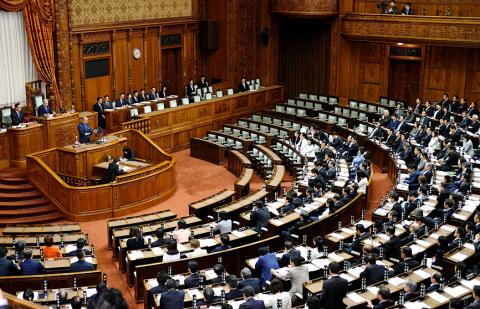Japan yesterday enacted a law to let in more foreign blue-collar workers to ease a labor shortage, despite criticism it was too hastily crafted and risked exposing the workers to exploitation.
Immigration has long been taboo in a country where many prize ethnic homogeneity, but the shrinking, aging population has increased pressure to relax strict controls on foreign workers.
The legislation, which was approved by parliament’s upper house in the early hours after delaying tactics by opposition parties, is to take effect from April. It creates two new categories of visas for blue-collar workers in sectors facing a labor crunch.

Photo: AFP
One category is for workers who can stay for up to five years, but cannot bring family members. The other is for more skilled foreigners, who can bring relatives and might eventually be eligible for residency.
Details including how many foreign workers are to be let in, what sectors are covered and what skills are needed are not spelled out in the law, one reason opposition lawmakers say more time should have been spent drafting the legislation.
The government has said that up to 345,150 blue-collar workers are to be allowed in over five years. Initially, a figure of 500,000 was considered.
Japanese Prime Minister Shinzo Abe is eager to respond to demands from businesses facing the tightest labor market in four decades, but he is also wary of angering conservatives in his party who fear more foreigners would mean a rise in crime and cultural clashes.
He has therefore said the new steps do not add up to an “immigration policy,” stressing instead the need to fill labor-market gaps.
However, critics say the government should accept the need for long-term foreign residents, not only to fill jobs, but to pay taxes and spend money, and should make better plans to integrate them.
“For the national government, foreign residents are forgotten people ... and those who stay are the exception,” said Toshihiro Menju, managing director of the Japan Center for International Exchange think tank.
The changes have fanned concern that the defects of a “technical trainees” program, introduced in the 1990s, will be perpetuated.
Critics see that program as an exploitative backdoor to unskilled foreign labor and want it abolished.
“Because the trainee program got a bad image, they are just relabeling it,” said Yohei Moriwake, head of a non-profit organization in Akitakata.

The CIA has a message for Chinese government officials worried about their place in Chinese President Xi Jinping’s (習近平) government: Come work with us. The agency released two Mandarin-language videos on social media on Thursday inviting disgruntled officials to contact the CIA. The recruitment videos posted on YouTube and X racked up more than 5 million views combined in their first day. The outreach comes as CIA Director John Ratcliffe has vowed to boost the agency’s use of intelligence from human sources and its focus on China, which has recently targeted US officials with its own espionage operations. The videos are “aimed at

STEADFAST FRIEND: The bills encourage increased Taiwan-US engagement and address China’s distortion of UN Resolution 2758 to isolate Taiwan internationally The Presidential Office yesterday thanked the US House of Representatives for unanimously passing two Taiwan-related bills highlighting its solid support for Taiwan’s democracy and global participation, and for deepening bilateral relations. One of the bills, the Taiwan Assurance Implementation Act, requires the US Department of State to periodically review its guidelines for engagement with Taiwan, and report to the US Congress on the guidelines and plans to lift self-imposed limitations on US-Taiwan engagement. The other bill is the Taiwan International Solidarity Act, which clarifies that UN Resolution 2758 does not address the issue of the representation of Taiwan or its people in

DEFENDING DEMOCRACY: Taiwan shares the same values as those that fought in WWII, and nations must unite to halt the expansion of a new authoritarian bloc, Lai said The government yesterday held a commemoration ceremony for Victory in Europe (V-E) Day, joining the rest of the world for the first time to mark the anniversary of the end of World War II in Europe. Taiwan honoring V-E Day signifies “our growing connections with the international community,” President William Lai (賴清德) said at a reception in Taipei on the 80th anniversary of V-E Day. One of the major lessons of World War II is that “authoritarianism and aggression lead only to slaughter, tragedy and greater inequality,” Lai said. Even more importantly, the war also taught people that “those who cherish peace cannot

US Indo-Pacific Commander Admiral Samuel Paparo on Friday expressed concern over the rate at which China is diversifying its military exercises, the Financial Times (FT) reported on Saturday. “The rates of change on the depth and breadth of their exercises is the one non-linear effect that I’ve seen in the last year that wakes me up at night or keeps me up at night,” Paparo was quoted by FT as saying while attending the annual Sedona Forum at the McCain Institute in Arizona. Paparo also expressed concern over the speed with which China was expanding its military. While the US